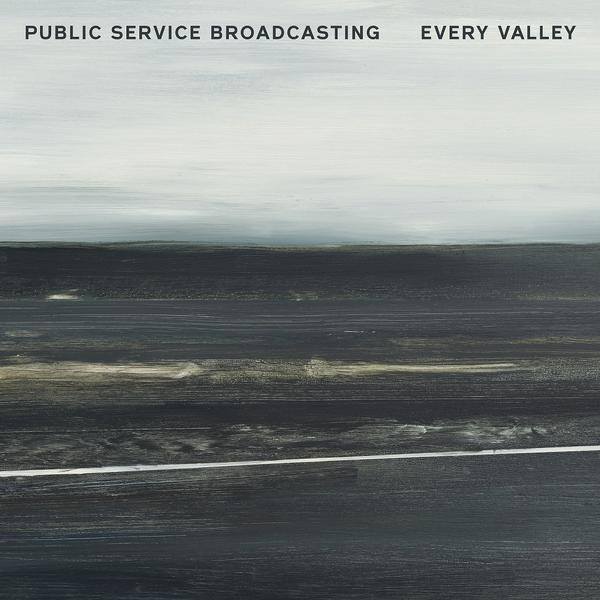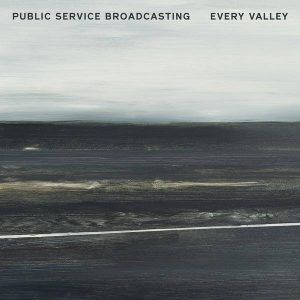The Quietus | 6 juillet 2017

Luke Turner à propos de Every Valley de Public Service Broadcasting
Les marchands de nostalgie se rappellent des mineurs avec des bêtises pompeuses, insipides et bizarrement sous-estimées. Luke Turner est vertueusement consterné.
En 1960, la BBC a diffusé un documentaire intitulé Borrowed Pasture. Narré par Richard Burton, il racontait l’histoire de Eugenius Okolowicz et Vlodek Bulaj, deux soldats polonais qui, incapables de retourner sur leurs terres natales après la seconde guerre mondiale, avaient du mal à joindre les deux bouts en travaillant la terre autour d’une ferme galloise décrépite. C’est une œuvre incroyable, évocatrice et poignante, capturant parfaitement la solitude de deux hommes qui se séparaient tous les soirs avec un “bonsoir M. Okolowicz” et “bonsoir M. Bulaj” avant de s’agenouiller à leurs lits pour faire leur prière.
J’évoque cela parce que Public Service Broadcasting m’ont longtemps donné l’impression qu’ils tentaient d’utiliser la musique pour atteindre quelque chose de tout aussi profond, avec leur utilisation d’images d’archives et de samples de vieux films une sorte d’approche de collage pour développer une nouvelle forme de documentaire. Dans d’autres mains, ce pourrait bien fonctionner, car le passé est riche et vid, rempli de tragédie et de joie, d’amour et de chagrin, d’envie et de destruction. Ce devrait et peut être une ressource riche pour les artistes qui souhaient nous montrer des vérités sur notre présent en explorant ces zones grises, narrations perturbées et vies oubliées. Depuis leur première sortie, le EP The War Room en 2012, Public Service Broadcasting se sont incroyablement trompés, avec des extraits maladroits et évidents d’archives audio lâchés en tas sur une musique qui sonne un peu mieux que des chutes du terrible groupe de trip-hop de la fin des années 2000 Lemon Jelly. Scandeleusement, ils ont plutôt prospéré, malgré le fait qu’ils soient l’équivalent musical de l’une de ces nuits en club épouvantables sur le thème du Blitz où les gens qui travaillent dans la pub se soulent en tenues des années 1940 avant de rentrer à la maison pour nettoyer le vomi du gin avec un torchon Keep Calm & Carry On.
Ce n’est probablement pas leur intention. Je suis sûr que leur troisième album studio Every Valley était censé être un commentaire significatif sur le déclin de l’industrie minière galloise et la destruction appliquée sur de nombreuses communautés au cours des années 1970 et 1980. Mais c’est là où se trouve le problème sur ce disque peu mémorable. Ce n’est que lorsque j’ai lu le communiqué de presse qui l’accompagnait que j’ai eu une idée de ce que Public Service Broadcasting essaient de dire. L’atmosphère générale de Every Valley, c’est “les mines ferment émoji triste”, mais à part cela ? Tout d’abord, les samples vocaux ne fonctionnent pas comme des paroles. Ils dépeignent une image en deux dimensions, délivrent une narration guindée. Pire, ils commençent à être agaçants après des écoutes répétées, au mieux diluant l’impact des paroles et de l’intention de l’orateur. Même le susmentionné Richard Burton, dont la phrase “Every little boy’s ambition in my valley was to become a miner… They were the kings of the underworld” ouvre le disque, commence à sonner plutôt lasse. Il est curieux qu’à la cinquième ou sixième écoute de la voix d’un mineur gallois à propos de leur gagne-pain qui disparaît, le gimmick de Public Service Broadcasting devient une appropriation de mauvais goût.
Un album sur le déclin d’une industrie qui employait des millions de personnes et qui a irrévocablement changé le paysage de ces îles aurait dû avoir un sens du sérieux et d’intensité. Il n’y a rien de cela ici. La gargouillante They Gave Me A Lamp, avec ses cuivres enjoués et ses chœurs “ooo ooo” est sur des plateaux bien trop ensoleillés, comme si c’était de la musique qui passait sur un film Pathé utopique futur d’anciens mineurs qui rentraient avec entrain dans le centre d’appel tout neuf, anticipant avec hâte une journée à répondre à des fans de Public Sector Broadcasting furieux qui se plaignent de leurs factures de gaz. Progress a un refrain vocal insipide de “I believe in progress” et pourrait se retrouver dans la sorte de livret de chorale chrétien moderne qui ne tient pas tête aux grands jours quand les chapelles des vallées résonnaient de véritables hymnes. Et après tout, les hommes qui ont fermé les mines l’ont fait au nom du progrès aussi. À l’envers, ils empruntent le titre du film de recrutement de 1975, People Will Always Need Coal pour une chanson qui tinte joyeusement. Quel est le commentaire ici, sous la musique légère grandement inapproprié ? Que les recrues en herbe ont été dupées ? Que nous aurions dû garder les mines ouvertes ? Face à la catastrophe climatique, ce serait une position absurde. Le fait que le vendredi 21 avril, la Grande-Bretagne a réussi sa première journée depuis des siècles sans brûler de charbon devrait être célébré, pas déploré. D’un point de vue environnemental, fermer les mines n’a pas été tant la tragédie que la manière dont les mineurs ont été abandonnés après cela. Ce morceau pose les bases du disque en entier, tout en tap tics de guitares irritants, batterie qui cataclope, une tentative de cuivres poignants en crescendo qui retombe à plat. All Out, c’est du Mogwai platement réimaginé pour conduire entre Merthyr Tydfil à Aberdare. Si vous arrivez à imaginer James Corden au volant, vous aurez l’idée générale de combien c’est confortablement ennuyeux. On se demande pourquoi James Dean Bradfield a accepté d’apparaître sur Turn No More, étant donné que les traumatisme psychiques infligés au Pays de Galles dans les années 1980 ont été une telle inspiration clé au fil des années, surtout étant donné que le groupe a essentiellement écrit un morceau qui somme comme s’il avait pu apparaître sur une compilation de karaoke des Manic Street Preachers. Même la présence (enfin !) de paroles en langue galloise de la part de Lisa Jen Brown ne peut sauver You + Me de la monstruosité au cul tandis qu’elle monte et monte, combinant la solidarité et l’amour : “If we stand as one we’ll have something they’ll never break”.
Cela me perplexe depuis longtemps que British Sea Power soient considérés comme des Scouts rock vieillots tandis que Public Service Broadcasting ont tout l’amout du public. BSP canalise l’intoxication psychédélique dérangée dans des chansons rock stratosphériques odes à la liberté de mouvement en Europe, la tragédie de la fonte de la calotte glaciaire, et des tentatives de s’opposer à l’âge algorithmique. La différence cruciale, c’est que là où la musique de British Sea Power est de ton élégiaques, ou que Kemper Norton, Laura Cannell, Darren Hayman, I Like Trains, Grumbling Fur et English Heretic puisent dans les histoires anciennes extraordinaires, Public Service Broadcasting colportent de la nostalgie confortable facielement digérable. Le mot en N est la seule énergie motrice, à la fois ici et sur le reste de la production risible de Public Service Broadcasting. Cela explique peut-être leur popularité bizarre, à la fois au Royaume-Uni (où la nostalgie est notre maladie nationale) et à l’étranger (où elle va avec l’image touristique d’une Grand-Bretagne où personne qui y vit n’est allé) et les fait sonner aussi comme le Brexit. Effectivement, l’esthétique de Public Service Broadcasting partage un conservatisme accidentel avec l’Albion pourri imaginé par Pete et Carl des Libertines, qui vont bientôt s’embarquer dans la tournée des villes de bord de mer britannique au nom stupide de Tiddeley On Pom Pom Tour.
Malgré l’insupportable suffisance de leurs chansons, c’était juste tolérable quand ils composaient des odes à des avions de chasse et la course à l’espace. Ici, cependant, cela laisse un goût âcre. Il y a beaucoup à propos de quoi être furieux quand on en vient à ce qui est arrivé à notre industrie minière, dans les vallées galloises et au-delà. Le gouvernement ne veut toujours pas ouvrir d’enquête publique sur les actions de la police contre les mineurs grévistes à Orgreave. Des centaines de milliers vivent dans l’anciens villes et villages miniers où le chômage est monnaire courante et les soutiens traditionnels de la communauté – les sociétés, la chapelle, le pub – se sont effrités ou ont été détruits. À la place, cela avance simplement la question si oui ou non il est possible d’être radical tout en faisant de la musique qui pourrait aussi bien être un stock de bibliothèque pour faire la bande sonore d’une pub pour une croisière sur le fleuve Bure, narré par Alan Partridge.
En 2014, Test Dept a créé une installation à propos des délabrés Dunston Coal Staithes sur le fleuve Tyne, en banlieue de Newcastle et Gateshead, où 14 000 tonnes de charbon par semaine ont été chargés sur des bateaux pour l’exportation. L’œuvre utilisait un collage d’images projetées de mines, grèves, discours et Thatcher combinées avec du son et des lumières pour faire un commentaire en collère grandement émotionnel sur ce qui avait été fait à l’industrie minière. Le collage de son finissait avec juste le murmure du fleuve alors que Take Me Home chanté par le South Wales Striking Miners Choir flottait sur les vagues noires : “I remember of the face of my father / as he walked back home from the mine”, chantaient-ils et j’ai regardé le public autour de moi ce soir-là et j’ai vu que personne n’avait les yeux secs. C’était l’une de mes expériences musicales les plus profondes de ma vie, exemple de comment le chant communal traditionnel et l’art contemporain pourrait provoquer une colère vertueuse pour la restitution et le changement. Public Service Broadcasting utilisent la même chanson pour refermer cet album. Cela sonne, comme à l’époque, comme une apparition. Pourtant cela révèle également le reste de Every Valley comme un exercice de fine superficialité, mémorial galvaudé aux efforts herculéens de ces inconnus qui trimaient sous les flancs de coteau humides de cette terre.
Traduction : 18 février 2024



